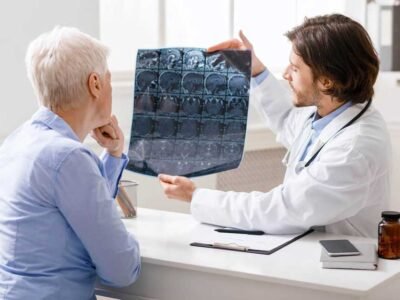If you suspect that you could have had a stroke, be sure to see a specialist for strokes treatment in Singapore as soon as possible. This is very important as strokes are severe and life-threatening.
With immediate treatment, you can at least hope for minimizing damage to the brain as it relies on a constant blood supply for oxygen and nutrients. The faster you get medical help after a stroke, the better your chances of minimizing brain damage and preventing long-term consequences.
On this page, we will share with you some of the best options for strokes treatment in Singapore. But first;
How long does your Body warn you Before a Stroke?
If you suspect that you have had a stroke, witnessed a stroke or helped a loved one who had a stroke, a relatively common question that could be lingering in your mind is; how long does your body warn you before a stroke? And what are the signs? Here’s what you need to know in this regard;
A stroke can strike suddenly. However, there are instances when your body may warn you before a stroke. While stroke symptoms often manifest abruptly, your body may warn you hours or days before a stroke. These warnings might include a severe headache or a transient ischemic attack (TIA), often termed a “mini-stroke.”
For the undiscerning eye, it may not be easy to tell for sure if what you’re dealing with is a stroke or something else. Some of the key warning signs to keep an eye for though include weakness or numbness that may affect the face, arm, or leg—usually on one side of the body.
This can be a key indicator. Also, difficulties in speech or understanding, vision problems, dizziness, coordination issues, movement difficulties, fainting, or unexplained seizures could be a cue to see a specialist who provides strokes treatment in Singapore.
Please, also note that strokes may also present uncommon symptoms like sudden nausea or vomiting unrelated to viral illnesses. You may also experience brief episodes of consciousness changes like confusion or coma, and abrupt severe headaches without a known cause.
A transient ischemic attack (TIA), akin to a stroke’s precursor, may also exhibit similar symptoms. The key difference with TIA is that the symptoms are usually are temporary and can last from minutes to 24 hours. Still, prompt medical attention is imperative upon suspecting a stroke or TIA.
What is the best Treatment for Stroke?
When it comes to strokes treatment in Singapore, an effective treatment depends on the type of stroke you’re dealing with whether it is ischemic or hemorrhagic.
Ischemic strokes are caused by blood clots in the brain. They often demand for immediate medication and preventive measures to forestall recurrence. Here are some of the ways they can be managed;
· Ischemic Strokes Treatment
If you’re diagnosed with an ischemic stroke, your doctor may put you on “Clot-buster” medication like alteplase to dissolve the clots and to restore blood flow. Usually, these medications are administered within 4.5 hours post-stroke onset.
Another treatment option that could help is known as Thrombectomy. It involves the removal of the clots to reinstate blood flow and is mostly preferred for severe cases.
To prevent clot formation, you may be prescribed antiplatelet drugs like aspirin. Anticoagulants like warfarin can also be used to reduce clotting risks depending on your unique conditions.
As part of your treatment plan, your doctor will also be keen on keeping your blood pressure in check. To achieve this, they may prescribe medications like diuretics, ACE inhibitors, or beta-blockers to regulate it.
Statins which lower cholesterol may also be used to reduce your risks of stroke risk. If you’re having risks like narrowed arteries, you may be recommended a carotid endarterectomy, a procedure that helps fix narrowed arteries. If you’ve had hydrocephalus which is a complication of ischemic strokes, you may need surgical shunting to drain excess fluid.
· Hemorrhagic Strokes Treatment
If you’re diagnosed with hemorrhagic strokes, the primary focus would be to control blood pressure and potentially reverse anticoagulant effects. Depending on your condition, emergency surgery may be recommended to alleviate brain bleeding.
Craniotomy is one of the procedures that may be recommended. It involves the removal of a skull section, to repair damaged vessels.
How do you Care for yourself after a Stroke?
To begin with, depending on how you come out of a stroke, you may need additional short-term treatments to help you cope or manage the challenges that come with the condition. For example, if you experience difficulty swallowing (dysphagia) you may be recommended a nasogastric tube insertion to help with nutrition intake.
You may also be given intravenous fluids to reduce your risks of dehydration. Also, compression stockings may be recommended to help you reduce leg blood clot risks (DVT).
If you’re dealing with malnutrition you might be recommended nutritional supplements. And for low oxygen levels, your doctor may suggest oxygen supplementation via nasal tubes or face masks. As for caring for yourself, there are so many things you can do. Here are seven main ones;
- Prevent Falls: Make your surroundings safer by clearing walkways and installing handrails or raised toilet seats. Use assistive devices like canes or walkers for stability. Wear nonslip shoes or socks to avoid falls.
- Take Medicines as Directed: Follow your prescribed medication regimen to manage pain and movement issues effectively.
- Stretch and Exercise: Engage in range of motion exercises to prevent contractures, which can restrict joint movement and may develop soon after a stroke. Your healthcare provider can guide you or your caregiver on appropriate exercises.
- Mental Strategies: Combat mental challenges with calendars, planners, medicine organizers, lists, timers, and labels to assist with memory and organization.
- Address Emotional Well-being: Seek therapy, counseling, or support groups to manage emotional impacts post-stroke. These resources can offer invaluable support and coping strategies.
- Manage Bladder and Bowel Issues: Opt for bladder and bowel movement training as advised by healthcare professionals. Medications might also assist in managing these problems effectively.
- Combat Energy and Sleep Problems: Collaborate with healthcare providers to design an exercise plan tailored to your abilities. Establish a consistent sleep schedule and discuss any potential sleep apnea concerns with your doctor for better sleep quality.
In Closing
Knowing that the symptoms you have been having were triggered by a stroke or that you have a risk of strokes can be bone-chilling. The good news though is that there are so many options for strokes treatment in Singapore. The key is to find a knowledgeable provider who can assess and recommend the best treatment plans depending on the stroke you’re dealing with.
To learn more about options for strokes treatment in Singapore or schedule an appointment with a specialist, call or visit the Chou Neuroscience Clinic at;
Chou Neuroscience Clinic
1 Farrer Park Station Road
#08-06 Connexion
Singapore 217562
OR
6 Napier Road
#08-08 Gleneagles Medical Centre
Singapore 258499
+65 6694 7942












